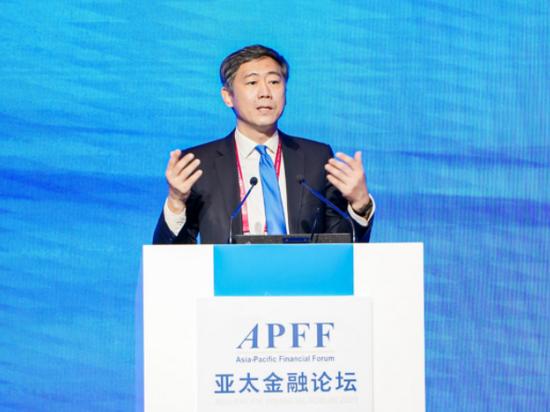David Daokui Li: The Financial Market Should Make Three Preparations for the Post-Pandemic Era
On October 15, the 2021 Asia Pacific Financial Forum (APFF) was held in Beijing, centered on the theme of Collaboration Towards Innovative and Inclusive Financial Markets. David Daokui Li, Director of the Academic Center for Chinese Economic Practice and Thinking (ACCEPT) at Tsinghua University, delivered a keynote speech.

“The Asia Pacific region is one of the most vital economic regions in the world. In particular, its population accounts for 38% of the global population, its GDP accounts for 61% of the global GDP, and its international trade accounts for 47% (nearly half!) of global trade volume. Therefore, as long as the Asia Pacific economy functions smoothly, the global economy will not face gloomy prospects. As long as no major financial setback or turmoil occurs in the Asia Pacific economy, the global financial market and economy will remain stable,” remarked Professor Li.
According to Li, the economies and financial markets in the Asia Pacific region should be prepared for a global economic recession in the post-pandemic era.
“There are two main reasons why I believe a recession is likely to occur in the global economy in the post-pandemic era. The first is directly related to the pandemic. After the outbreak, governments of various countries—and developed countries in particular—significantly relaxed their fiscal and monetary policies. As a result, the global debt level has increased rapidly, especially the level of government debts,”he said.
Professor Li believes that these rising levels of government debts, in combination with enterprises’ increasing leverage ratios, could spell disaster. Enterprises increased their leverage ratios during the pandemic because financial institutions delayed their debt collection from enterprises that suffered from the impact of COVID-19. The reason this could lead to a recession is that the pandemic will end eventually, and the debt burden will become prominent once the economy recovers, leading to a variety of negative impacts.
Professor Li continued, “Second, over the past year, the international community has attached great importance to the issue of climate change and decarbonization. After the end of the COVID-19 pandemic, governments of all countries—and especially developed countries—will pay closer attention to carbon reduction. It has become the social consensus that we must identify ways to achieve decarbonization, and we will certainly spare no efforts to limit carbon emissions. Moreover, given that the current technology of replacing conventional carbon energy is far from mature and can incur extremely high costs, it is more feasible to attempt every method to limit the production of carbon energy across the globe. This is why we have seen disproportionately rising prices of carbon energy so far.”
According to David D. Li, the demand for carbon energy remains steady despite the reduction of supply, which has led to the rapidly surging prices. Therefore, based on a preliminary analysis, the global economy is likely to enter a recession in the post-pandemic era.
“In terms of the timing of the recession, I believe that it may take place six months or one year after the end of the COVID-19 pandemic. Once the pandemic is gone, the economy will experience a retaliatory rebound before returning to normal. At this moment, the issues of deleveraging and decarbonization will begin to impact the global economy,” he said.
Against this backdrop, Professor Li believes that the financial market should make three preparations to minimize negative impacts in the post-pandemic era:
First, the government should appropriately concentrate the listing or issuance of bonds. “Of course, this is at least partially a matter of government. I think that under China’s circumstances, certain local government bonds should be further concentrated and converted into central government bonds, since the central government has a higher reputation and is less likely to cause panic in the market. Otherwise, the exposure of numerous local government bonds will inevitably lead to widespread panic,” said Li.
Second, the financial market should promote restructuring in an orderly manner. According to Dr. Li, “If a large-scale default occurs, economic growth will decline and some enterprises will become unable to repay their previous debts. Therefore, the financial market should integrate itself with the real economy and the industrial economy, and should collaborate with the government to promote orderly restructuring rather than trampling on market players indefinitely.”
Third, it is necessary to further accelerate investment in low-carbon technologies. Professor Li explained, “This is the fundamental solution to averting the recession related to decarbonization. As I previously mentioned, a recession could take place after the pandemic for two primary reasons—namely, heightened debts and decarbonization. While identifying solutions to the recession led by carbon reduction, we need to promptly lower the cost of low-carbon, carbon-free, and zero-carbon technologies. In this respect, the financial market will play an utterly crucial role. We must make more efforts in investment, research, and development to lower the costs of wind power, solar energy, and hydropower.”




